人教版八年级上册英语单元知识点归纳复习
复习人教版八年级英语上册各单元必背知识点整理(打印版)
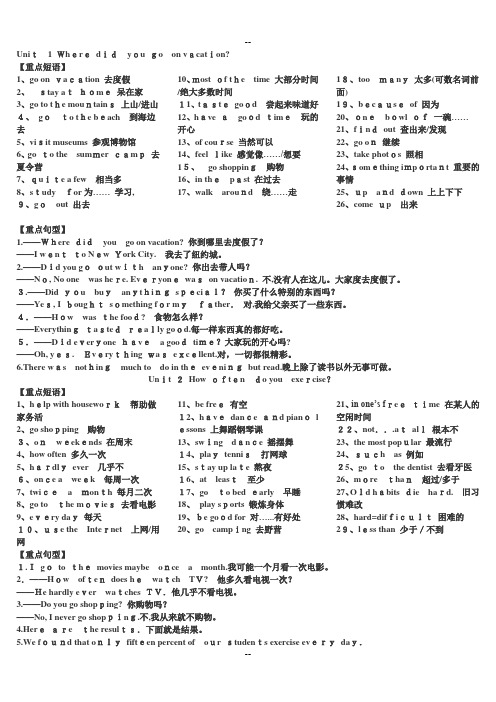
Unit 1 Wheredidyou go on vacation? 【重点短语】1、go on vacation 去度假2、stay athome呆在家3、go to the mountains上山/进山4、goto the beach到海边去5、visit museums 参观博物馆6、go to the summer camp去夏令营7、quite a few相当多8、studyfor为…… 学习,9、goout 出去10、most of the time 大部分时间/绝大多数时间11、tastegood尝起来味道好12、have agood time玩的开心13、of course 当然可以14、feel like 感觉像……/想要15、go shopping购物16、in thepast 在过去17、walk around绕……走18、toomany太多(可数名词前面)19、becauseof 因为20、onebowl of一碗……21、findout 查出来/发现22、go on继续23、take photos 照相24、something important 重要的事情25、up and down 上上下下26、come up出来【重点句型】1.——Where didyou go on vacation? 你到哪里去度假了?——I wentto New York City.我去了纽约城。
2.——Did you goout with anyone? 你出去带人吗?——No, No one was here. Everyonewason vacation. 不,没有人在这儿。
大家度去度假了。
3.——Did you buyanythingspecial?你买了什么特别的东西吗?——Yes, I boughtsomething for myfather.对,我给父亲买了一些东西。
4.——How was the food?食物怎么样?——Everythingtastedreally good.每一样东西真的都好吃。
人教版八年级上册英语知识点归纳

⼈教版⼋年级上册英语知识点归纳⼋年级英语上册知识点总结Unit 1: How often do you exercise?【复习⽬标】会使⽤频率副词及短语;能描述课余时间的活动安排;会描述基本饮⾷结构。
【语⾔⽬标】● What do you usually do on weekends? I sometimes go to the beach.● How often do you eat vegetables? Every day● Most students do homework every day.【重点词汇】●always, usually , often, sometimes , hardly , ever, never.●how often, once , twice , three times a week , every day.【应掌握的词组】1. go to the movies 去看电影2. look after = take care of 照顾3. surf the internet 上⽹4. healthy lifestyle 健康的⽣活⽅式5. go skate boarding 去滑板6. keep healthy=stay healthy 保持健康7. exercise=take(much)exercise=do sports 锻炼8. eating habits 饮⾷习惯9. take more exercise 做更多的运动10. the same as与什么相同11. be different from 不同12. once a month ⼀⽉⼀次13. twice a week ⼀周两次14. make a difference to 对什么有影响15. how often 多久⼀次16. although = though 虽然17. most of the students=most students18. shop=go shopping=do some shopping 购物19. as for ⾄于20. activity survey 活动调查21. do homework 做家庭作业22. do housework 做家务事23. eat less meat吃更少的⾁24. junk food 垃圾⾷物25. be good for 对什么有益26. be bad for 对什么有害27. want to do sth 想做某事28. want sb to do sth 想某⼈做某事29. try to do sth 尽量做某事30. come home from school 放学回家31. of course = certainly = sure 当然32. get good grades 取得好成绩33. some advice34. hardly=not nearly / almost not ⼏乎不35. keep/be in good health 保持健康36. b e stressed out 紧张的,有压⼒的37. take a vacation 去度假48. g et back 回来【应掌握的句⼦】1. How often do you exercise? 你(你们)多久锻炼⼀次⾝体?How often + 助动词do(does 或did) + 主语+ do sth.? 疑问词how often 是问频率(多久⼀次),(在这⾥助动词do(does 或did) 是起帮助构成疑问的作⽤)与⼀般现在时或⼀般过去时连⽤,回答⼀般是⽤表⽰频率的副词,如:once, twice, three times , sometimes, often, quite, often, never, every day, once a week , twice a month , three times a month , three or four times a month 等。
人教版八年级英语上册第一单元知识点归纳
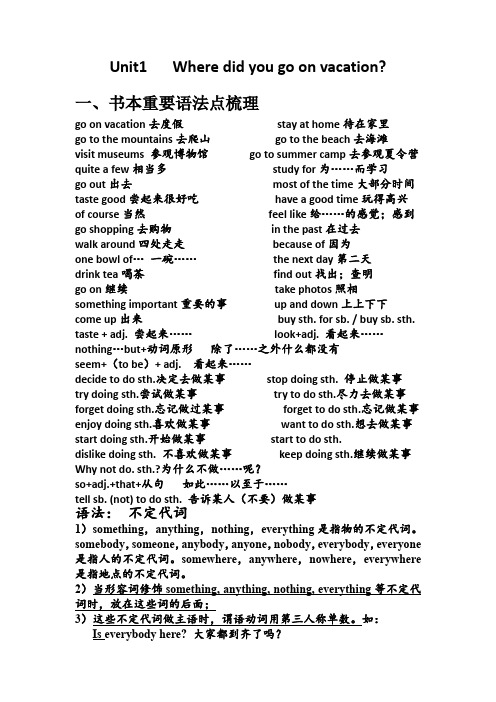
Unit1 Where did you go on vacation?一、书本重要语法点梳理go on vacation去度假stay at home待在家里go to the mountains去爬山go to the beach去海滩visit museums 参观博物馆go to summer camp去参观夏令营quite a few相当多study for为……而学习go out出去most of the time大部分时间taste good尝起来很好吃have a good time玩得高兴of course当然feel like给……的感觉;感到go shopping去购物in the past在过去walk around四处走走because of因为one bowl of…一碗……the next day第二天drink tea喝茶find out找出;查明go on继续take photos照相something important重要的事up and down上上下下come up出来buy sth. for sb. / buy sb. sth. taste + adj. 尝起来……look+adj. 看起来……nothing…but+动词原形除了……之外什么都没有seem+(to be)+ adj. 看起来……decide to do sth.决定去做某事stop doing sth. 停止做某事try doing sth.尝试做某事try to do sth.尽力去做某事forget doing sth.忘记做过某事forget to do sth.忘记做某事enjoy doing sth.喜欢做某事want to do sth.想去做某事start doing sth.开始做某事start to do sth.dislike doing sth. 不喜欢做某事keep doing sth.继续做某事Why not do. sth.?为什么不做……呢?so+adj.+that+从句如此……以至于……tell sb. (not) to do sth. 告诉某人(不要)做某事语法:不定代词1)something,anything,nothing,everything是指物的不定代词。
人教版八年级英语上册知识点总结和复习要点
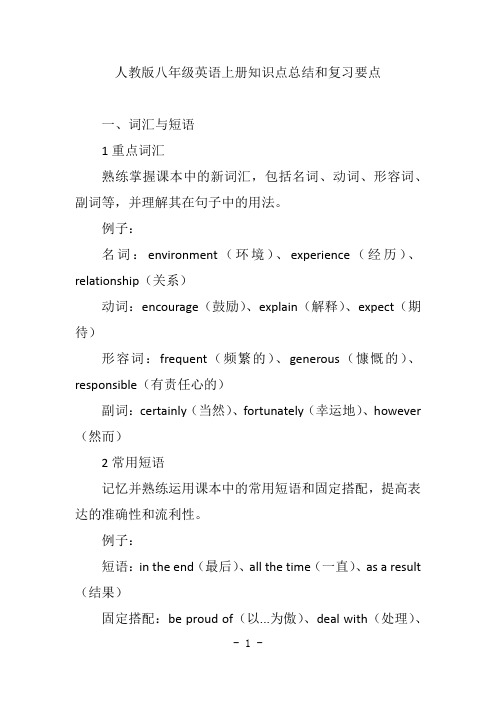
人教版八年级英语上册知识点总结和复习要点一、词汇与短语1重点词汇熟练掌握课本中的新词汇,包括名词、动词、形容词、副词等,并理解其在句子中的用法。
例子:名词:environment(环境)、experience(经历)、relationship(关系)动词:encourage(鼓励)、explain(解释)、expect(期待)形容词:frequent(频繁的)、generous(慷慨的)、responsible(有责任心的)副词:certainly(当然)、fortunately(幸运地)、however (然而)2常用短语记忆并熟练运用课本中的常用短语和固定搭配,提高表达的准确性和流利性。
例子:短语:in the end(最后)、all the time(一直)、as a result (结果)固定搭配:be proud of(以...为傲)、deal with(处理)、pay attention to(注意)二、句型与语法1基本句型熟练掌握五种基本句型,包括主语+谓语、主语+谓语+宾语、主语+谓语+间接宾语+直接宾语、主语+谓语+宾语+宾语补足语、主语+系动词+表语。
例子:主语+谓语:She sings.(她唱歌。
)主语+谓语+宾语:I like apples.(我喜欢苹果。
)主语+谓语+间接宾语+直接宾语:He gave me a book.(他给了我一本书。
)主语+谓语+宾语+宾语补足语:I found the book interesting.(我发现这本书很有趣。
)主语+系动词+表语:She is beautiful.(她很漂亮。
)2时态深入学习并掌握现在完成时、过去进行时、一般将来时、过去将来时等时态的用法和形式。
例子:现在完成时:I have already seen that movie.(我已经看过那部电影了。
)过去进行时:They were playing football when I called them.(我打电话给他们时,他们正在踢足球。
人教版八年级上册英语知识点总结归纳
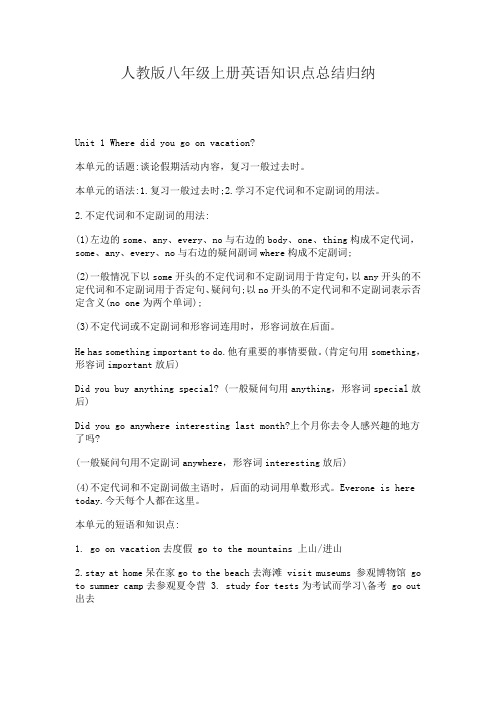
人教版八年级上册英语知识点总结归纳Unit 1 Where did you go on vacation?本单元的话题:谈论假期活动内容,复习一般过去时。
本单元的语法:1.复习一般过去时;2.学习不定代词和不定副词的用法。
2.不定代词和不定副词的用法:(1)左边的some、any、every、no与右边的body、one、thing构成不定代词,some、any、every、no与右边的疑问副词where构成不定副词;(2)一般情况下以some开头的不定代词和不定副词用于肯定句,以any开头的不定代词和不定副词用于否定句、疑问句;以no开头的不定代词和不定副词表示否定含义(no one为两个单词);(3)不定代词或不定副词和形容词连用时,形容词放在后面。
He has something important to do.他有重要的事情要做。
(肯定句用something,形容词important放后)Did you buy anything special? (一般疑问句用anything,形容词special放后)Did you go anywhere interesting last month?上个月你去令人感兴趣的地方了吗?(一般疑问句用不定副词anywhere,形容词interesting放后)(4)不定代词和不定副词做主语时,后面的动词用单数形式。
Everone is here today.今天每个人都在这里。
本单元的短语和知识点:1. go on vacation去度假 go to the mountains 上山/进山2.stay at home呆在家go to the beach去海滩 visit museums 参观博物馆 go to summer camp去参观夏令营3. study for tests为考试而学习\备考 go out 出去4. quite a few相当多,不少(后跟可数名词复数)take photos照相 most of the time大部分时间5.buy sth for sb = buy sb sth为某人买某物6. taste good. 尝起来很好taste(尝起来)、look(看起来)、sound(听起来)为感官动词,后跟形容词7.have a good\great\fun time过得高兴,玩得愉快(=enjoy oneself) 8. go shopping去购物 9. nothing…but+动词原形:除了……之外什么都没有He had nothing to do at home but read yesterday.昨天他在家除了读书无事可做。
人教版英语:八年级上册各单元必考知识点汇总

人教版英语:八年级上册各单元必考知识点汇总Unit1 Where did you go on vacation?【重点语法】不定代词:不指名代替任何特定名词或形容词的代词叫做不定代词。
用法注意:1. some和any +可数名/不可数名。
some多用于肯定句,any多用于否定句、疑问句和条件从句。
有些问句中用some,不用any,问话者希望得到对方肯定回答。
2.由some, any, no, every与body, one, thing构成的复合不定代词作主语时,其谓语动词用三单。
3.不定代词若有定语修饰,该定语要置于其后:如:somethinginteresting【重点短语】1. buy XXX为某人买某物2. taste + adj.尝起来……3. nothing...but + V.(真相)除……以外甚么都没有4. seem + (to be) + adj看起来5. XXX抵达某地6. XXX do XXX决定做某事7. try doing sth.测验考试做某事/ try to do sth.极力做某事8. XXX喜欢做某事9. want to do sth.想去做某事10. XXX.入手下手做某事=XXX.11. stop XXX截止做某事辨别:stop to do sth.停下往来来往做某事12.XXX XXX.不喜欢做某事14.so + adj + that +从句如此……以至于……16. tell sb. (not) to do sth.告诉某人(不要)做某事17. keep XXX继续做某事18. forget to do XXX.忘记去做某事XXX忘记做过某事【词语辨析】1.XXX拍照quite a few+名词复数“很多…”2. seem +描绘词看起来…... You seem happy today.XXX.似乎/好像做某事I seem to have a coldIt seems +从句似乎..….It XXX.seem like ...好像,似乎…..It seems like a good idea.XXX小地址(注:若后跟地点副词XXX,介词需省略,如:arrive here;get home)4. XXX感觉像…XXX.想要做某事5. wonder(想知道)+疑问词(who, what, why)引导的从句。
八年级(初二)英语上册(人教版)各单元复习知识要点
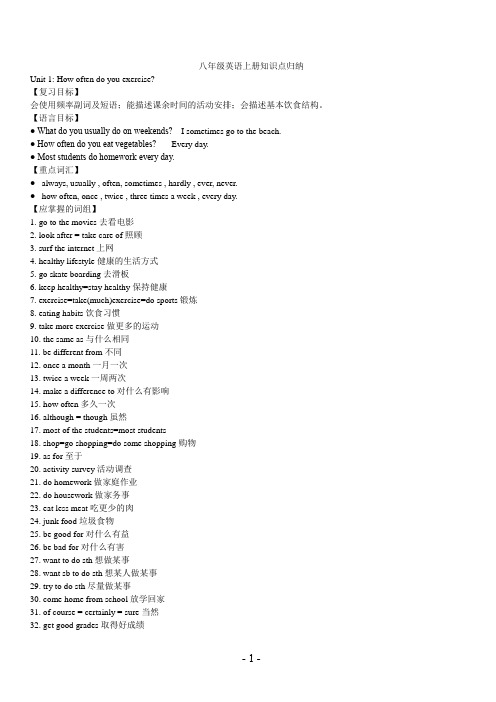
八年级英语上册知识点归纳Unit 1: How often do you exercise?【复习目标】会使用频率副词及短语;能描述课余时间的活动安排;会描述基本饮食结构。
【语言目标】● What do you usually do on weekends?I sometimes go to the beach.● How often do you eat vegetables?Every day.● Most students do homework every day.【重点词汇】●always, usually , often, sometimes , hardly , ever, never.●how often, once , twice , three times a week , every day.【应掌握的词组】1. go to the movies 去看电影2. look after = take care of 照顾3. surf the internet 上网4. healthy lifestyle 健康的生活方式5. go skate boarding 去滑板6. keep healthy=stay healthy 保持健康7. exercise=take(much)exercise=do sports锻炼8. eating habits 饮食习惯9. take more exercise 做更多的运动10. the same as 与什么相同11. be different from 不同12. once a month一月一次13. twice a week一周两次14. make a difference to 对什么有影响15. how often 多久一次16. although = though虽然17. most of the students=most students18. shop=go shopping=do some shopping 购物19. as for至于20. activity survey活动调查21. do homework做家庭作业22. do housework做家务事23. eat less meat吃更少的肉24. junk food垃圾食物25. be good for 对什么有益26. be bad for对什么有害27. want to do sth 想做某事28. want sb to do sth想某人做某事29. try to do sth 尽量做某事30. come home from school放学回家31. of course = certainly = sure当然32. get good grades取得好成绩33. some advice34. hardly=not nearly / almost not几乎不35. keep/be in good health保持健康36.be stressed out紧张的,有压力的37. take a vacation 去度假48.get back 回来【应掌握的句子】1. How often do you exercise? 你(你们)多久锻炼一次身体?How often + 助动词do(does或did) + 主语 + do sth.? 疑问词how often是问频率(多久一次),(在这里助动词do(does或did) 是起帮助构成疑问的作用)与一般现在时或一般过去时连用,回答一般是用表示频率的副词,如:once, twice, three times…, sometimes, often, quite, often, never, every day, once a week , twice a month , three times a month , three or four times a month 等。
新人教版八年级上册英语全册期末复习必背知识点归纳
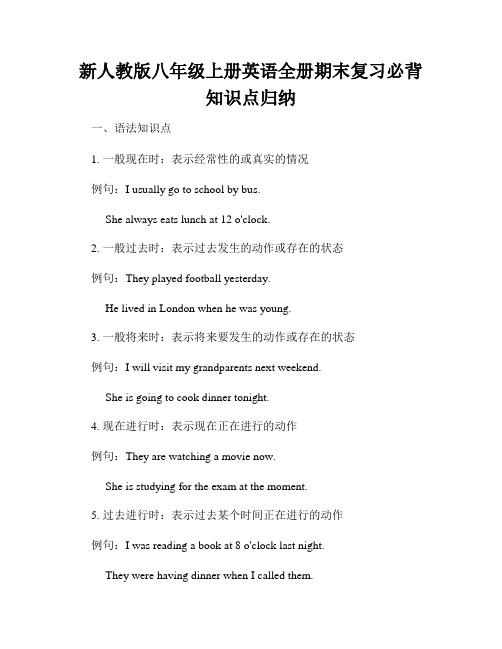
新人教版八年级上册英语全册期末复习必背知识点归纳一、语法知识点1. 一般现在时:表示经常性的或真实的情况例句:I usually go to school by bus.She always eats lunch at 12 o'clock.2. 一般过去时:表示过去发生的动作或存在的状态例句:They played football yesterday.He lived in London when he was young.3. 一般将来时:表示将来要发生的动作或存在的状态例句:I will visit my grandparents next weekend.She is going to cook dinner tonight.4. 现在进行时:表示现在正在进行的动作例句:They are watching a movie now.She is studying for the exam at the moment.5. 过去进行时:表示过去某个时间正在进行的动作例句:I was reading a book at 8 o'clock last night.They were having dinner when I called them.6. 情态动词 can 和 could:表示能力或许可例句:I can swim very well.He could speak three languages when he was young. 7. 情态动词 must 和 have to:表示义务、必须或强制性例句:You must finish your homework before going out.I have to wake up early tomorrow.8. 情态动词 should:表示建议或应该例句:You should eat more vegetables for better health. She should go to bed early for enough sleep.9. 动词不定式:表示目的、原因、结果或时态等例句:I went to the supermarket to buy some fruits.She is happy to hear the good news.二、词汇知识点1. 人称代词:用于代替特定人或物例句:He is my brother.They are good friends.2. 数词:表示数量的词语例句:There are ten students in the classroom.I have two cats and three dogs.3. 形容词:修饰名词或代词,描述人或物的特征例句:She is a beautiful girl.This is a big house.4. 副词:修饰动词、形容词、副词等,表示时间、地点、程度等例句:She runs fast.He speaks English fluently.5. 介词:介绍名词与其他词语之间的关系例句:I have a pen in my bag.The book is on the table.6. 连词:连接句子、词组或单词例句:I like swimming and playing basketball.She can play the guitar or the piano.7. 冠词:用于限定名词例句:I have an apple.The book on the table is mine.三、题型解析1. 完形填空题:根据上下文意思,选出合适的单词填空Tom: What's your favorite ________?Emily: I like watching ________.Tom: Me too. Let's go to the ________ tonight.A. colorB. movieC. sportD. book答案:B2. 阅读理解题:阅读短文,回答相关问题例题:My name is Lucy. I am twelve years old. I ________ to school every day. My favorite ________ is English. I like playing basketball ________ school. My dream is to become a ________ in the future.What does Lucy like playing?A. basketballB. soccerC. tennisD. volleyball答案:A3. 选择填空题:选择合适的单词或短语填空例题:Lucy: What's your ________ food, Tom?Tom: I like ________ because it tastes delicious.A. favoriteB. leastC. difficultD. easy4. 任务型阅读题:根据文章内容,完成相应的任务例题:请你根据短文内容,回答以下问题:What is the main idea of the passage?答案:The passage is about Lucy's daily life and her dream.四、写作技巧1. 写作时要注意使用适当的句式和词汇,使文章更加丰富多样。
- 1、下载文档前请自行甄别文档内容的完整性,平台不提供额外的编辑、内容补充、找答案等附加服务。
- 2、"仅部分预览"的文档,不可在线预览部分如存在完整性等问题,可反馈申请退款(可完整预览的文档不适用该条件!)。
- 3、如文档侵犯您的权益,请联系客服反馈,我们会尽快为您处理(人工客服工作时间:9:00-18:30)。
八上英语各单元知识点复习Unit1 Where did you go on vacation?1. go on vacation 度假holiday但vacation表示长的假期2. visit museums 参观博物馆3. go to summer camp去夏令营4.something interesting有趣的东西5. in excitement兴奋地1)something,anything,nothing,everything是指物的不定代词。
somebody,someone,anybody,anyone,nobody,everybody,everyone是指人的不定代词。
2)当形容词修饰不定代词、不定副词时,放于其后;如,something special;3)something,somebody,someone,somewhere用于肯定句,表示请求或建议的疑问句中,而anything,anybody,anyone,anywhere 用于否定句、疑问句及条件状语从句中。
6.buy sth. for sb. 或buy sb. sth 如:buy some books for me. = buy me some books.7.提建议的句子①What/ how about +doing sth.? 如:What/ How about going shopping?②Why don’t you + do sth.? 如:Why don’t you go shopping?③Why not + do sth. ? 如:Why not go shopping?④Let’s + do sth. 如:Let’s go shopping⑤Shall we/ I + do sth.? 如:Shall we/ I go shopping?9. long time no see 好久不见10 . most of the time 大多数时间11.enjoyable activities 令人愉快的活动12. try paragliding 尝试滑翔伞运动13. 辨析:get to/reach/arrive 都是“到达“的意思get to+地点=reach+地点= arrive at+地点(小)=arrive in+地点(大)14.nothing...but...意为“除......之外;只有”,如:I have nothing to do but watch TV all day long. 我整天除了看电视什么也没干。
15. feel like 意为:“感受到;摸起来”,后跟宾语从句或名词。
如:I felt like I was a bird. 我感觉我是一只鸟。
It feels like a stone. 它摸起来像一块石头。
另外,构成短语feel like doing sth.意为“想做某事”。
如:I feel like eating.我想吃东西。
16.enjoy doing sth . 喜欢做… enjoy oneself 过得愉快=have fun/have a good time.17. the top of the hill 山顶18. feed(fed) hens and pigs 喂鸡和猪19. I wonder what life was like here in the past. 我想知道过去这里的生活是什么样的感到疑惑;想知如:I wonder where they are going.21.Still no one seemed to be bored. 仍然没有人感到烦闷。
1)seem意为“好像;似乎;看来”,是个连系动词,构成的短语有:seem(to be)+adj. 似乎...... 如:He seemed ( to be) ill yesterday. 昨天他似乎病了。
It seems that + 从句似乎...... 如:It seems that he was ill yesterday. 昨天他似乎病了。
2)bored (adj),“感到厌倦的,,其主语是某人;boring(adj),意为无聊的,其主语是某物。
23. Because of the bad weather, we couldn’t see anything below.1)because of + 名词/代词/名短I had to move because of my job. 因为工作的原因24. 形容词/副词+enough 如:She is not old enough to go to school.enough+名词如:enough umbrellas 足够的雨伞25. so+形/副+that 从句:She is so popular that everyone likes her.such+名短+ that 从句:She is such a popular girl that... 27.What a difference a day makes! 一天的差异多大啊!1. What a/an + adj.+ n(单)+主+谓!或What + adj. +n(复不)+主+谓!2. How+ adj. +主+谓(联系动词)!或How + adv+主+谓(实义动词)!28. I just stayed at home most of the time to read and relax.Unit2 How often do you exercise?1. exercise (v/n)的用法1)(动):锻炼. 如:He exercises every day.2) (可数名词). 如:do morning/ eye exercises; do math exercises(不可数名词) :如:We often do / take exercise on weekends.2.-How often do you usually go shopping? —Sometimes/Twice a week. 有时候/一周两次.1) go shopping 意为“去购物”。
Go+ v- ing : 表示进行某项活动。
如:Go swimming/ shopping/skating/skiing/fishing/climbing/hiking2)频率副词:always=all the time, usually, often, sometimes=at times , hardly ever, never(1).sometimes: 有时候;sometime:某时;some times:许多次/倍; some time: 一段时间2)how often表示“多久一次”,是对动作的频率进行提问。
其回答通常有:频率副词:always, usually, often, sometimes, hardly ever, neverhow often 次数+时间段: 如:once or twice a weekevery +时间段: every day (每天) 区别:everyday (每天的;日常的)3. 空闲的Are you free tonight? be free 免费的 4 junk food 垃圾食品5. 满的;饱的” …be full of… : The bottle is full of water. 瓶子里装满了水。
6.She says it’s good for my health. 她说那对我的健康有益。
(1)be good for:“对……有好处”。
如:Doing exercise is good for our health.(2)be good at:“擅长于……” 如:He is good at playing football.(3) be good with: “与……相处好” 如:The teacher is good with his students.7.go online = use the Internet :上网8. Teenager magazine 青少年杂志9. more than two hours=over two hours:超过10. go to the dentist: 去看牙医11. keep healthy = stay healthy = keep in good health: 保持健康12. ask sb. to do : 叫…做某事Teacher asked me to clean the classroom.ask sb. about sth. : 问某人某事We asked our students about their free time activities.ask sb. for sth. : 向某人要求… 如:ask teacher for help 13. help sb. with sth. 如:They help me with this problem. 他们帮助你解决这个问题。
14. (n) 惊讶: to one’s surprise 令某人惊讶的是in surprise 惊讶地I was surprised at the news = I was surprised to hear the news.15. fifteen percent of the students 百分之十五的学生16. swing dance 摇摆舞17.although(conj):“尽管;虽然”,表示转折关系,同义词有though, 不能与but同时使用。
如:Although they’re neighbors, they don’t play together.= They’re neighbors, but they don’t play together.尽管他们是邻居但是他们不在一起玩。
18. maybe (adv): 也许,大概(Maybe) he (maybe) knows it.如:Maybe he is at home.= He maybe is at home.= He may be at home.19. It’s good to relax by using the Internet or watching game shows.by: 通过… 方式He learns English by singing English songs.through 通过… 方式+ 名词:The best way to relax is through exercise20. such as =like + 名短:如:such as winning the game.21.Old habits die hard. 恶习难改. die(v):死亡;消失death(n): 死亡;22.Most students use it for fun and not for homework.23.You can spend time with your friends and family as you play together.度过(时间)如:spend the weekend with family花费(时间、钱)如:He spent 20 yuan (in) buyingthe magazine. Unit3 I’m more outgoing than my sister1.事实上in fact2. 唱歌比赛the singing competition 3头发更短的the one with shorter hair 4. 真正关心我truly care about me 5.只要;既然…as long as… 6. 一…就… as soon as…7. 分享一切share everything 8. 与…不同be different from 9.与…一致be the same as… 10. 与… 相似的be similar to… 13.打电话询问更多信息call for more information14. 形容词和副词的比较1)比较级:表示两者(人或物)之间的比较2 )大多数形容词和副词有三个等级:原级、比较级、最高级: good –better - best3.) 加more/most ①.部分双音节和多音节词②.-ed/ing结尾的形容词;③adj+ly→adv.4.) 双写的词:big hot fat thin red wet sad二.比较级基本句型:1 实义动词+ adv./ (比than)如:Lucy runs more slowly than Lily.2. 主语必须与对比成分保持一致:Her hair is longer than yours.(→your hair)3 as+adj./adv.(原级)+as …如同…一样。
